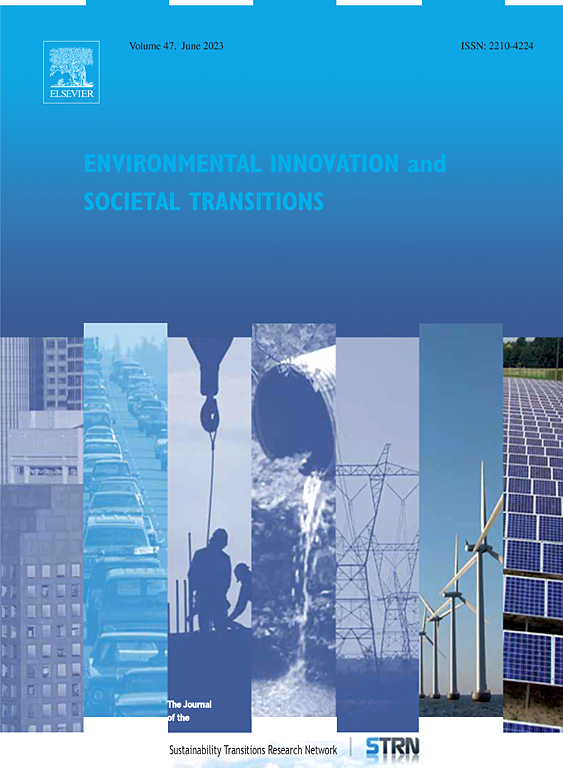Driving the change: How do personal factors and socio-economic context influence electric vehicles adoption across Europe?
IF 6.1
2区 经济学
Q1 ENVIRONMENTAL SCIENCES
Environmental Innovation and Societal Transitions
Pub Date : 2025-09-11
DOI:10.1016/j.eist.2025.101044
引用次数: 0
Abstract
This paper investigates the determinants influencing consumer adoption of battery electric vehicles (BEVs) across three European markets characterized by distinct socio-economic contexts and varying levels of EV market maturity. We develop a theoretical model based on Theory of Planned Behavior. A survey was conducted involving 737 consumers in Germany, Italy, and Norway. The data was analyzed using structural equation modeling, multigroup analysis, and Kruskal-Wallis’s test. The findings indicate that hedonic motivations, ascription of responsibility, subjective norms, and direct experience significantly enhance consumers' willingness to purchase BEVs. Conversely, range anxiety and environmental concerns negatively affect purchase intentions. Significant differences in consumer perceptions of BEVs and the effect of behavioral determinants across the three countries are highlighted. This research contributes to the literature on sustainable mobility adoption and proposes several avenues for future investigation. The findings can inform the development of marketing strategies and policy interventions to foster EV adoption in Europe.
推动变革:个人因素和社会经济背景如何影响欧洲电动汽车的采用?
本文研究了影响消费者采用纯电动汽车(bev)的因素,这些因素在三个欧洲市场具有不同的社会经济背景和不同的电动汽车市场成熟度。我们建立了一个基于计划行为理论的理论模型。对德国、意大利和挪威的737名消费者进行了调查。采用结构方程模型、多组分析和Kruskal-Wallis检验对数据进行分析。研究发现,享乐动机、责任归属、主观规范和直接体验显著增强了消费者购买纯电动汽车的意愿。相反,里程焦虑和环境担忧对购买意愿产生负向影响。报告强调了三个国家消费者对纯电动汽车认知的显著差异以及行为决定因素的影响。本研究对可持续交通采用的文献做出了贡献,并提出了未来研究的几个途径。研究结果可以为营销策略的制定和政策干预提供信息,以促进欧洲电动汽车的采用。
本文章由计算机程序翻译,如有差异,请以英文原文为准。
求助全文
约1分钟内获得全文
求助全文
来源期刊

Environmental Innovation and Societal Transitions
Energy-Renewable Energy, Sustainability and the Environment
CiteScore
13.60
自引率
19.40%
发文量
90
审稿时长
56 days
期刊介绍:
Environmental Innovation and Societal Transitions serves as a platform for reporting studies on innovations and socio-economic transitions aimed at fostering an environmentally sustainable economy, thereby addressing structural resource scarcity and environmental challenges, particularly those associated with fossil energy use and climate change. The journal focuses on various forms of innovation, including technological, organizational, economic, institutional, and political, as well as economy-wide and sectoral changes in areas such as energy, transport, agriculture, and water management. It endeavors to tackle complex questions concerning social, economic, behavioral-psychological, and political barriers and opportunities, along with their intricate interactions. With a multidisciplinary approach and methodological openness, the journal welcomes contributions from a wide array of disciplines within the social, environmental, and innovation sciences.
 求助内容:
求助内容: 应助结果提醒方式:
应助结果提醒方式:


